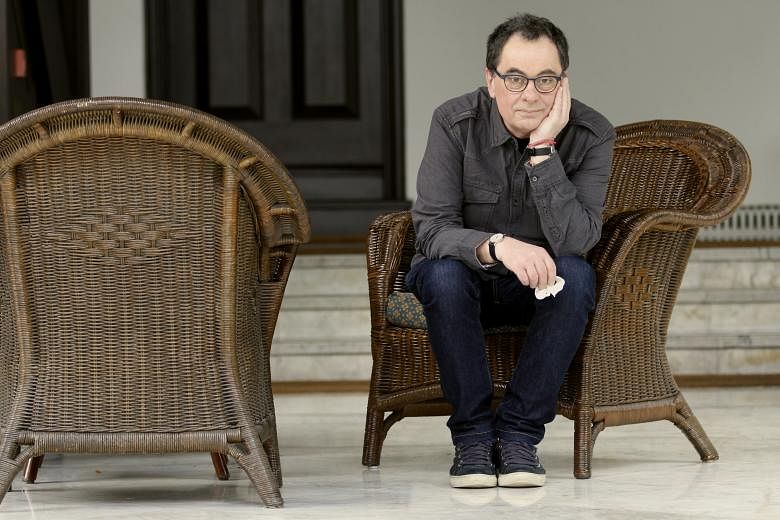Renowned publisher Gerhard Steidl has donated 1,600 premium photobooks to independent arts space Deck, to set up what is believed to be South-east Asia's first public library dedicated fully to photography.
On April 8, the library in Deck's galleries at 120A Prinsep Street, packed with a selection of high-end books with a total value of €100,000 (S$153,800), will open to members of the public. The books are not for loan.
Mr Steidl has picked titles put out by his eponymous German publishing company, among them rare items that have yet to hit the shelves of libraries in Asia, and books by creatives such as American documentary photographer Joel Sternfeld, known for his large-format colour photographs, and fashion titan Karl Lagerfeld.
He says: "These are the finest books I have ever done."
Bespectacled and impeccably groomed, with a brisk, assured way about him, Mr Steidl has long been regarded publishing royalty; the tireless head of a publishing company made legendary by its relentless attention to detail.
His company, started in 1972, has put together and printed about 4,000 books in its four-storey premises in Gottingen, Germany. Every one of these books has passed through the hands of Mr Steidl himself.
-
VIEW IT / STEIDL DECK: 1001 BOOKS OF STEIDL
-
WHERE: 120A Prinsep Street, Deck
WHEN: April 8 to May 22 (exhibition), noon to 7pm (Tuesday to Saturday), noon to 5pm (Sunday). Closed on Monday and public holidays. Library will remain open after show ends
ADMISSION: Free
He turns 66 this year, but still insists on being involved in the nitty-gritty processes, poring over paper stock and linen for his books, and following each title's journey from layout to print.
The Steidl Deck library, he says, will showcase some of his most interesting books - those published between 2005 and 2015.
"I believe those years are the most exciting ones because it is the peak of my know-how and, I believe, the peak of fine art printing," he says. "Never has there been so many good papers. The ink technology is developed to the highest standards. It is the golden age of making books."
Deck founder and director Gwen Lee hopes the photobook library will not just be a source of knowledge and inspiration, but also where people with a passion for pictures can connect with one another.
An accompanying exhibition that gives an intimate peek into the art of bookmaking will run from April 8 to May 22. Mr Steidl will be giving a masterclass and lecture on bookmaking and publishing at Deck on the opening day.
Both he and Deck have big plans for the library - they hope to eventually take it around Asia.
This region is relatively new ground for him, but he has found a resounding interest in bookmaking here.
He says: "There is a real hunger, a thirst, to get in contact with physical books, to be connected with the old world and the traditional cultural concepts of Europe.
"That is something Asia is looking for. I think the young here will pick up these ideas, but change them into new processes and products. My hope is that the new ideas swim back to Europe and change our lives too."
After all, industrial products - refrigerators, cellphones, cars - manufactured in Asia have already found their way to the rest of the world, he adds.
"It's very hard to find objects of culture from Asia in European or American stores now. But I think it would not be surprising if these objects produced in Asia, like books, swim back into our culture in the future."
The veteran of a battered book industry, for years gripped by uncertainty over its survival and fears that the advent of e-books might bring about its collapse, is fiercely optimistic about the future of the printed book.
"Years ago, everybody was saying that the printing industry and the book industry are a dying species. That's simply not true," he says, pointing to how e-book sales have stagnated in recent years.
"So the physical book is in a very healthy condition. There is more interest and more demand. It is like a little revolution. After years of being frustrated that the physical book market might be shrinking, it's like we're taking a step into a new age of making books."
He attributes this to the leaps in technology for makers of books themselves and changing attitudes of the modern reader, who is now more educated when it comes to culture and visual matters.
He has dedicated decades of his life to his books, but each day brings with it a new thrill. Even now, he speaks of the printed book with a surprising tenderness. "For me, the next book I'm doing is always the most exciting one. So when I wake up in the morning, I'm looking to what I can do today."
Mr Steidl, who has no children of his own, adds: "I am not finished yet. It's like when you have children and you have to grow them, and you can't say one day is enough, now I'm finished.
"My children - my books - are still very young, so I need a lot of time to grow them and bring them to life."


